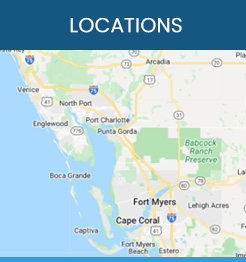DeQuervain’s Tendonitis Treatment Specialist in Fort Myers, and Port Charlotte FL
De Quervain tendonitis is an inflammatory condition that affects the tendons on the thumb side of the wrist. If you have de Quervain tendonitis, you will possibly experience pain when turning your wrist, grasping anything, or making a fist. At Florida Hand Center, Dr. Stephen L. Helgemo, Jr. MD provides the most relevant treatment options for De Quervain’s tendonitis. If you or a loved one would like to know more about DeQuervain’s Tendonitis, its causes and treatment, contact Florida Hand Center today! We have convenient locations for you in Port Charlotte FL, and Fort Myers FL. Request an appointment online.


Table of Contents:
What is it?
What causes it?
How is it diagnosed?
What are the symptoms?
What are the treatments?
What are the results of the surgery?
DeQuervain’s tendonitis is a condition that causes pain in the wrist and/or the near the base of the thumb. The tendons that attach to the thumb pass through a fleshy tunnel on the side of the wrist called a tendon sheath. Normally, this tunnel is lubricated by synovial fluid that results in painless thumb and wrist motion. Tendonitis causes swelling of the tendons in the sheath, which can restrict the tendons movement and cause pain with use of the hand and thumb.
DeQuervain’s tendonitis is caused by inflammation of the tendons or tendon sheath with repetitive activities or chronic overuse of the hand and wrist. Direct injury is a less common cause of DeQuervain’s tendonitis. Risk factors include jobs or hobbies where repetitive hand and wrist motions are necessary, such as carpentry, office work, or needlework. The condition occurs most frequently in middle-aged women.
The most common symptom is pain in the wrist or thumb with activities that involve twisting or a side-to-side motion of the wrist, such as lifting, opening doors, or reaching behind your back. A thickening of the tendons can develop as they pass back and forth in the wrist. The pain can become severe as the condition worsens, and can feel as if it is radiating across the whole wrist or up into the arm.
A history of pain in the thumb side of the wrist is consistent with DeQuervain’s tendonitis. Examination will often reveal a positive Finkelstein test. This is done by forcefully moving the patient’s wrist and thumb from side to side. X-rays and other special tests like an MRI are not always necessary for diagnosis, but may be used to exclude other conditions, such as arthritis or a fracture.
The initial DeQuervain’s treatment consists of a steroid injection, splinting, and activity modifications. This should be followed with a short course of ice massage reduce any post-injection pain and swelling. The injection should be effective within two weeks, and may be repeated if necessary. If two injections do not result in adequate pain relief, a cast may be applied for two weeks for more complete immobilization of the wrist. A short course of occupational therapy may also be employed. When non-operative DeQuervain’s treatment fails, surgery is often recommended. A small incision is made in the wrist and the sheath is cut over the tendons, which relieves the friction and allows the inflammation to resolve. Florida Hand Center can perform the surgery in an outpatient facility, which does not usually require general anesthesia.
After surgery, you will be placed in a splint, and you will need to rest the hand and wrist for a week. At your one week postoperative/occupational therapy visit, your bandage and sutures will be removed, and you will start therapy. You will wear your brace for approximately three more weeks, and limit lifting and heavy use. You should regain full use of your hand/wrist between four to six weeks after surgery.
Complications following the DeQuervain’s tendon release are very uncommon and include infection, scar tenderness, stiffness, and pain. Recurrence of the tendonitis is possible. Once you have had surgery, it is important to follow guidelines of your postoperative care to prevent recurrence of this problem. Sometimes, a change of employment or job adaptations are necessary in order to accomplish this.
Call us or schedule an appointment today! We serve patients from Port Charlotte FL, Fort Myers FL, Punta Gorda FL, Cape Coral FL, Lake Suzy FL, Estero FL, Murdock FL, Charlotte Harbor FL, Harbour Heights FL, and Solana FL.


Additional Services You May Need
▸ Carpal Tunnel Syndrome
▸ Basilar Joint Arthritis
▸ Trigger Finger
▸ Dupuytren’s Contracture
▸ DeQuervain’s Tendonitis
▸ Ganglion Cysts
▸ Cubital Tunnel Syndrome
▸ Lateral Epicondylitis
▸ Small Joint Arthritis
▸ Wrist Pain
▸ Scaphoid Fracture Treatment
▸ Flexor Tendon Injuries Treatment
▸ Hand Tumors Removal Surgery
▸ Work Related Hand Injuries







